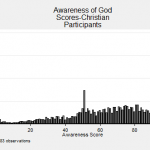There is confusion in popular discussion about how many Americans are atheists. Here I review how many Americans are atheists, and why there are such varying estimates of this number.
Short answer: 3%-5% of Americans are atheists.
Atheists are people who believe that God does not exist. They are not the same as agnostics, who don’t know if God exists, or belief that it can’t be known. Among people who believe in God, there’s a wide range of beliefs as well as certainty in those beliefs.
The most straightforward survey measure of atheism is to ask people if they believe that God exists. A Gallup poll in 2010 asks this, and it found that:
• 5% of Americans report that they are “convinced that God does not exist.”
Another quality measure is offered by the General Social Survey, probably the best-known, most rigorous social survey out there. It gives respondents a series of statements about their beliefs in God, and it asks which come closest to what they believe. The 2010 survey found that:
• 3% of Americans “don’t believe in God.”
• (Another 6% reported that they “don’t know whether there is a God and don’t believe there is any way to find out,” i.e., agnostics.)
These surveys, and other similarly-worded questions, give us the best estimate of how many Americans are atheists, and they consistently range between 3% and 5%.
However, there are two other approaches to measuring God beliefs that are often misinterpreted when it comes to atheism.
The first misinterpreted approach is to ask people if they think of themselves as an atheist. For example, the 2008 Pew Landscape Study found that 1.6% of Americans define themselves as Atheist. Likewise, the 2008 American Religious Identification Study found less than 1% of Americans describe themselves as atheists.
This type of question gets at social identification rather than people’s actual beliefs, and some people who believe that God does not exist do not think of themselves as atheists. There’s nothing wrong with asking this type of question as long as we understand what it’s measuring: a self-identity rather than actual beliefs.
The second misinterpreted approach is to ask people simply if they believe in God, with no other clarifying information. For example, a 2011 Gallup Poll found that 7% of Americans did not believe in God. A 2011 PRRI/RNS Religion News Survey found that 8% did not believe. A 2009 Harris Poll found 9%.
Here’s the problem this this approach: It’s not a measure of atheism. Yes, atheists will say that they don’t believe in God. But so too will agnostics, who do not believe in God because they don’t think it can be known. In addition, there are people in the world who may believe that God exists, but they don’t “believe” in God in the sense of having faith and following Him. They too will answer “no” to this question. That’s the problem: This question is ambiguous as to whether it’s getting at belief of God’s existence or acceptance of God as a guiding force.
Think about it. If I ask you if you believe in Barack Obama, I’m not asking if you think he exists as a person, rather do you affirm him as a leader. Or if I ask if you belief in freedom of speech, I’m not asking if you think it exists in our society, but rather if you agree with it.
Likewise, some unknown number of people interpret the question “do you believe in God” to mean do they have faith and follow God. (The GSS question gets around this by giving other belief statements for the respondent to choose from, and they clarify the meaning of the “do you believe in God” statement for some respondents.)
I asked the 200 students in my social psychology class what they thought the question meant. About a third to two-fifths thought it was asking whether they have faith and follow God, not about whether He exists.
Because of these two other approaches, we hear a wide range of estimates about atheism, as ranging from 1% to 10% (or more) of the population. The actual range of reliable estimates is much more narrow, at between 3%-5%.











